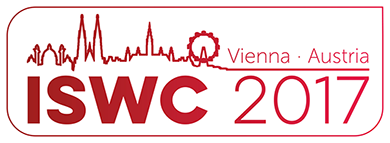Call for Doctoral Consortium Papers
The ISWC 2017 Doctoral Consortium will take place as part of the 16th International Semantic Web Conference in Vienna, Austria. This forum will provide PhD students an opportunity to share and develop their research ideas in a critical but supportive environment, to get feedback from mentors who are senior members of the Semantic Web research community, to explore issues related to academic and research careers, and to build relationships with other Semantic Web PhD students from around the world.
The Consortium aims to broaden the perspectives and to improve the research and communication skills of these students.
The Doctoral Consortium is intended for students who have a specific research proposal and some preliminary results, but who have sufficient time prior to completing their dissertation to benefit from the consortium experience. Generally, students at the end of their first year, in their second or at the beginning of their third year of PhD will benefit the most from the Doctoral Consortium. In the Consortium, the students will present their proposals, get specific feedback and advice on how to improve their research plan and discuss other students’ proposals.
All proposals submitted to the Doctoral Consortium will undergo a thorough reviewing process with a view to providing detailed and constructive feedback. The international program committee will select the best submissions for presentation at the Doctoral Consortium.
We anticipate that students with accepted submissions at the Doctoral Consortium will receive travel fellowships to offset some of the travel costs but they will be asked to attend the whole day of the Doctoral Consortium.
Submission information
We ask the PhD students to submit an 8 page description of their PhD research proposal. All proposal have to be submitted electronically via the EasyChair conference submission System (https://easychair.org/conferences/?conf=iswc2017dc). The proposal text must have at least 8 sections (some can be very short), addressing each of the following questions:
- Problem statement: What is the problem that you are addressing?
- Relevancy: Why is the problem important? Who will benefit if you succeed? Who should care?
- Related work: How have others attempted to address this problem? Why is the problem difficult?
- Research question(s): What are the research questions that you plan to address?
- Hypotheses: What hypotheses are related to your research questions?
- Preliminary results: Do you have any preliminary results that demonstrate that your approach is promising?
- Approach: How are you planning to address your research questions and test your hypotheses? What is the main idea behind your approach? The key innovation?
- Evaluation plan: How will you measure your success – faster/ more accurate/ less failures/ etc.? How do you plan to test your hypothesis? What will you measure? What will you compare to?
- Reflections: Why do you think you will succeed where others failed? Provide an argument, based either on common knowledge or on evidence that you have accumulated, that your approach is likely to succeed.
Additional submission requirements
- All submissions must be single-author submissions, the author being an actual PhD student. Please acknowledge your PhD advisor(s) and other contributors and supports (e.g. funding agencies) in the Acknowledgements section
- The students submitting a proposal will also have the opportunity to participate to the blind review of two proposals of other students in order to familiarize themselves with the review process.
- Students accepted to present at the Doctoral Consortium must plan to attend the DC for the whole day in order to gain as much value as possible from the experience.
- Please remember that the DC submission is not the same as a research paper.
- Submissions must be in PDF or in HTML and be formatted according to the Springer Publications format for Lecture Notes in Computer Science (LNCS). For details on the LNCS style, see Springer’s Author Instructions. For HTML submission guidance, please see the HTML submission guide.
- Accepted submissions will be published with CEUR-WS.org.
Topics of Interest
Topics of interest include, but are not limited to the topics listed below. Please note that these topics are the same as for the main ISWC Research track:
- Web of data, information retrieval, information extraction, natural language processing and artificial intelligence techniques for the Semantic Web
- Knowledge representation, extraction, access and reasoning on the Web
- Management of semantics and data on the Web, including Linked Data
- Semantic Web data analysis and mining.
- Languages, tools, and methodologies for representing and managing semantics and data on the Web
- Cleaning, quality assurance, and provenance of Semantic Web data, services, and processes
- Ontology-based data access and integration/exchange on the Web
- Ontology engineering, ontology-based knowledge representation and ontology patterns for the Web
- Ontology modularity, mapping, merging, and alignment for the Web
- Accessing, searching and querying the Semantic Web
- Supporting multi-linguality, diversity and variety in the Semantic Web
- User interfaces and interaction with semantics and data on the Web
- Information visualization and exploratory analysis methods for Semantic Web data
- Personalized and contextualized access to Semantic Web data and applications
- Social semantics methods and applications
- Geospatial & Temporal semantics and data on the Web
- Data streams, the Internet of Things and the Web of Things
- Semantic technologies for mobile platforms
- Trust, privacy, and security on the Semantic Web
- Infrastructure, Semantic Web and Linked Data for cloud environments
| Important Dates | |
|---|---|
| Submission: | May 25, 2017 |
| Notifications: | June 30, 2017 |
| Camera-ready versions: | July 18, 2017 |
All deadlines are midnight Hawaii time.
Program Chairs
- Lora Aroyo
Vrije Universiteit Amsterdam, Amsterdam, The Netherlands - Fabien Gandon
Université Côte d’Azur, Inria, CNRS, I3S, Sophia-Antipolis, France
Program Committee
The list of program committee members can be found here.
Recommended Reading
Is This Really Science? The Semantic Webber’s Guide to Evaluating Research Contributions Abraham Bernstein, Natasha Noy.

